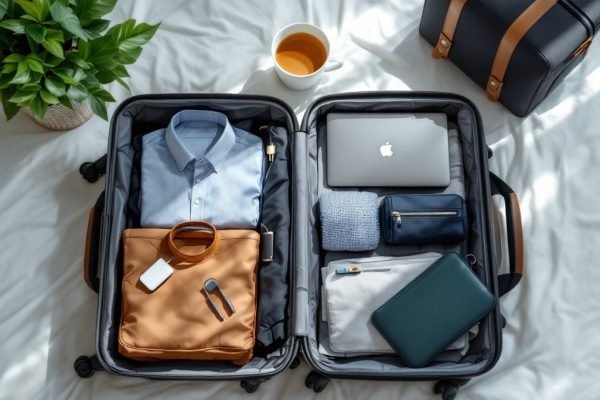Essential Tips for Traveling with Friends Without Arguments
Want a smooth, drama-free group trip? Studies show pre-trip planning is key to minimizing conflict. Learn how aligning expectations on budget, activities, and personal space enhances group dynamics. Discover practical tips for open communication, itinerary building, and managing individual needs, ensuring a memorable and harmonious adventure for everyone. Start planning your dream trip today!
Important information

- Open communication about trip expectations, budget, and individual preferences is crucial for minimizing potential conflicts and ensuring a smooth trip.
- Establish a shared vision for the trip by discussing the main purpose, whether it’s relaxation, adventure, or cultural exploration. Agree on the trip style, budget, and must-see attractions beforehand.
- Plan for personal space and alone time to prevent burnout and foster positive group dynamics. Consider separate rooms to accommodate different needs and preferences.
- Balance planned activities with spontaneous adventures. A structured itinerary ensures you hit key sights, while unplanned moments create lasting memories. Allow for mini-solo adventures to reduce tension and recharge.
- Address common triggers like exhaustion and hunger by scheduling regular meals and breaks. Openly discuss any concerns promptly to prevent them from escalating.
Align Expectations for a Successful Trip
Traveling with friends requires open communication for a smooth and enjoyable trip. Studies show that discussing expectations beforehand can significantly reduce potential conflicts. So, initiate a conversation with your travel companions before embarking on your journey.
Define the Trip’s Focus
What is the main purpose of your trip? Is it relaxation, adventure, or cultural exploration? Establishing a shared vision ensures everyone is on the same page and has similar expectations.
Pre-Trip Planning
Before departure, agree on the trip style and budget. Create a must-see list together and discuss preferred activity levels. Some may prefer sightseeing, while others may prioritize relaxation. Consider accommodation preferences and the need for personal space to prevent friction later on.
Open Communication
Openly discuss individual needs and preferences to ensure everyone feels heard and respected. This fosters a positive group dynamic and prevents misunderstandings.
Shared Vision
Establishing a shared vision for the trip ensures everyone is on the same page. Discuss the trip’s focus, whether it’s relaxation, adventure, or cultural exploration.
Pre-Trip Agreement
Before departure, agree on the trip style, budget, and must-see list. Discuss preferred activity levels and accommodation preferences. Addressing these upfront prevents disagreements later.
What Should Travelers Agree On Before the Trip?
Planning a group trip? Start by discussing everyone’s ideal activities and setting a clear budget. Decide on your accommodations, whether it’s a luxurious hotel or a cozy cabin. These initial conversations are vital to prevent unexpected issues and ensure a smoother, more enjoyable experience for all. For example, some may prefer adventurous hikes while others envision relaxing by the beach. Sharing preferences upfront helps find activities everyone will enjoy. A pre-trip budget agreement also avoids potential financial disagreements. Open communication is key to a successful and fun group vacation.
Why pre-trip planning matters
Pre-trip planning is essential for a successful group getaway. It allows everyone to voice their expectations and preferences, minimizing potential conflicts during the trip. Open communication and early agreement on key aspects contribute to a more harmonious and enjoyable experience for all participants.
How to plan effectively
- Discuss desired activities, from thrilling hikes to relaxing beach days.
- Establish a clear budget with spending limits to avoid financial disagreements.
- Decide on accommodations that suit everyone’s preferences and budget.
- Share preferences upfront to find activities that appeal to the whole group.
How Aligning Expectations Prevents Conflict
Planning a group trip can be exciting, but mismatched expectations can lead to conflict. Open communication is key to a successful trip. Discuss everyone’s expectations beforehand to avoid disagreements about activities, budget, and pace. Aligning expectations ensures a smoother, more enjoyable experience for everyone. Planning ahead fosters a positive group dynamic, minimizes stress, and maximizes the fun. Connect with your travel companions early, clarify expectations, and enjoy the adventure together!
Discuss Preferences and Priorities
Planning a trip with others? Open communication is key to a smooth and enjoyable experience. Start by discussing everyone’s travel styles. Do you prefer budget-friendly hostels and local buses, or luxurious hotels and rental cars? Understanding each other’s preferences early on helps create a trip everyone will love.
Finances
Openly discussing finances is crucial. Transparency avoids unexpected costs and disagreements. Determine a comfortable budget range for everyone and explore cost-effective options together.
Interests
What matters most to each traveler? Is it history, adventure, food, or relaxation? Understanding individual priorities helps tailor the itinerary to everyone’s interests, ensuring a fulfilling experience for all.
Step 1: Share your travel style.
Discuss your preferred accommodations, transportation methods, and activities. Do you prefer hostels or hotels? Public transport or rental cars? Sharing these preferences early on helps create a trip that caters to everyone’s comfort levels.
Step 2: Discuss your budget.
Transparency about finances is essential to avoid unexpected costs and disagreements. Determine a comfortable budget range for everyone and explore cost-effective options together.
Step 3: Share your interests.
What are your must-see destinations and activities? Does anyone have specific interests like history, adventure, or food? Understanding individual priorities helps tailor the trip to everyone’s interests.
How Honest Discussions About Budget and Priorities Help
Open communication about finances is crucial for managing expectations and ensuring everyone feels comfortable with spending habits. Discussing priorities, such as budget-friendly meals or free activities, can prevent disagreements. Furthermore, expense-tracking apps like Splitwise simplify shared expenses and make settling up a breeze.
Let Everyone Pick Their ‘Must-Go’ Spots
Planning a trip together makes everyone excited and feel like they own the experience. This personalized way of choosing a destination increases trip satisfaction and enjoyment, making everyone feel valued and heard.
Communicate Effectively to Enhance Group Dynamics
Planning a successful group trip hinges on open communication. Discuss everyone’s interests, budget, and accommodation preferences together. Honest conversations about money prevent disagreements later. Letting everyone contribute to destination selection can boost group morale.
Communicate Openly
Express your expectations and preferences clearly. Use “I” statements when voicing concerns to create a supportive environment. For example, say “I’m concerned about the cost of this activity,” rather than “This activity is too expensive.” Regular check-ins ensure everyone feels heard and valued.
Address Concerns Promptly
Address any issues immediately to prevent them from escalating into conflicts. Regular communication helps maintain a positive group dynamic throughout the trip. Consider everyone’s dietary needs and meal budgets to minimize potential disagreements.
Initiate open communication. Discuss everyone’s interests, budget, and preferences for accommodations. Transparency about finances helps prevent disagreements later on.
Involve everyone in decision-making. Letting everyone contribute to choosing the destination strengthens group morale and ensures everyone feels included.
Express your needs and preferences clearly. Use “I” statements to voice concerns and foster a supportive atmosphere. For instance, say “I prefer a quieter environment in the evenings,” rather than “Don’t be so loud.”
Conduct regular check-ins. Ensure everyone feels heard and address any problems immediately to prevent conflict. Promptly addressing issues helps maintain a positive group dynamic.
Consider dietary needs and budgets. Taking everyone’s dietary restrictions and meal budgets into account minimizes potential disagreements and ensures a smoother trip.
Key Topics to Discuss: Interests, Budgets, and Accommodations
Planning a trip? Open communication is key for a smooth and enjoyable experience. Discuss everyone’s interests and explore desired sights and activities. Have an honest conversation about budget limitations, ensuring everyone is comfortable with the anticipated expenses. This prevents financial surprises and potential disagreements later. Consider accommodation preferences, from budget-friendly hostels to comfortable hotels or spacious vacation rentals. Discuss transportation options, such as public transport versus rental cars, and preferred activities, like hiking or museum visits. These pre-trip conversations pave the way for a more harmonious and memorable adventure.
Discuss everyone’s interests and explore desired sights and activities.
Have an open conversation about budget limitations, ensuring everyone is comfortable with the anticipated expenses.
Consider accommodation preferences, from budget-friendly hostels to comfortable hotels or spacious vacation rentals.
Discuss transportation options, such as public transport versus rental cars, and preferred activities, like hiking or museum visits.
How Communication Prevents Drama and Stress
Open communication is crucial for a smooth trip, fostering understanding and minimizing stress among travelers. Addressing issues promptly prevents arguments and creates a comfortable atmosphere for sharing, ultimately enhancing the travel experience. Unexpected problems, such as disagreements about activities, can arise. Openly discussing these conflicts ensures everyone feels heard and respected, leading to a more enjoyable and harmonious journey.
Avoiding Conflict by Planning Ahead
Assigning roles fosters teamwork and shared responsibility, distributing the workload more evenly.
Detailed itineraries keep everyone informed and minimize uncertainty by outlining planned activities.
Designated meeting points and times ensure the group stays connected and can address any issues that arise, preventing potential conflicts and enhancing the overall travel experience.
Assigning Roles to Each Traveler
Distributing tasks ensures a shared workload, preventing burnout and fostering teamwork. This also minimizes frustration. For example, one person could handle flights, another accommodations, and a third the budget. This organized method streamlines the entire process. With everyone contributing a manageable share, the planning experience becomes more balanced and enjoyable.
Creating Itineraries to Keep Everyone Informed
A well-planned itinerary is essential for a smooth and enjoyable trip. It keeps everyone informed about the planned activities, managing expectations and minimizing travel stress. With a clear daily schedule, confusion is avoided, and the shared understanding enhances the overall travel experience. A well-structured itinerary offers several key benefits:
- Reduced stress, itineraries eliminate the need for constant decision-making, allowing travelers to relax and enjoy the journey,
- Maximized time, careful planning ensures efficient use of available time, allowing for more experiences and exploration,
- Enhanced group cohesion, a shared itinerary fosters a sense of purpose and unity among travel companions,
- Controlled budget, pre-planned activities and bookings help manage expenses effectively,
- Unforgettable memories, a well-executed itinerary contributes to a more fulfilling and memorable travel experience.
Designating a Time and Place to Regroup
Establishing a designated meeting point and time is crucial, especially when venturing into unfamiliar areas. This practice keeps the group together and well-informed, promoting a sense of unity. Imagine getting separated in a crowded marketplace. A pre-determined meeting spot becomes invaluable. Anyone who gets lost knows exactly where to rejoin the group, reducing anxiety and ensuring a more pleasant experience for everyone. It also simplifies communication and updates. Choose a location that is both memorable and easy to find.
Set Boundaries for Personal Space and Time
Personal time is essential for recharging and pursuing hobbies, preventing burnout and fostering positive group dynamics.
Respecting personal space, even among close friends, is equally crucial. This prevents individuals from feeling overwhelmed and significantly enhances the travel experience.
Separate rooms offer the added benefit of privacy and a personal retreat, minimizing friction and maximizing relaxation.
Ultimately, having your own space greatly improves group travel.
Why Alone Time is Important
Personal time allows everyone to recharge and contributes significantly to a positive group dynamic. Respecting individual space is essential, preventing anyone from feeling overwhelmed and enhancing the overall trip experience. While individual needs for solitude vary, incorporating alone time into your itinerary fosters a supportive environment that benefits everyone. Prioritizing personal time during group travel offers several key advantages:
- Reduced stress and improved mood, allowing individuals to relax and enjoy the trip more fully.
- Enhanced group cohesion as members return to the group refreshed and ready to engage positively.
- Increased self-awareness and personal growth, providing opportunities for introspection and reflection.
- Improved sleep quality, leading to better energy levels and overall well-being during the trip.
- Greater appreciation for shared experiences, as personal time provides a contrast that highlights the value of group activities.
Benefits of Separate Rooms in Group Trips
Traveling with a group is more enjoyable when everyone has their own space. Separate rooms reduce friction and enhance the overall experience, allowing individuals to recharge and pursue personal interests.
- Accommodates different sleep schedules – early risers won’t disturb those who prefer to stay up late.
- Eliminates temperature preference conflicts, a common source of disagreement.
Providing individual rooms fosters a more harmonious group dynamic, leading to a more satisfying trip for all.
Balance Scheduled and Unscheduled Days
A balanced trip blends the structure of planned activities with the thrill of spontaneous adventures. This caters to various travel styles, ensuring everyone enjoys the journey. Pre-booking tours and accommodations for must-see attractions guarantees you won’t miss out, while unplanned moments create the most cherished memories. Adaptability is also essential, as travel plans can change unexpectedly.
While group travel can be fantastic, allowing for individual exploration is crucial for a harmonious experience. These mini-solo adventures act as a pressure valve, boosting relaxation and preventing burnout. Whether it’s pursuing personal interests or enjoying quiet moments, these breaks recharge everyone, fostering a happier group dynamic.
Advantages of Mixing Planned and Spontaneous Activities
Planning your trip is crucial, but don’t forget the excitement of spontaneous adventures. A well-planned itinerary ensures you visit the must-see attractions. However, embracing unplanned moments can lead you to hidden gems and unexpected culinary experiences. These spontaneous discoveries often become treasured travel memories. Combining a structured plan with flexibility caters to various travel styles, offering the best of both worlds for everyone in your group.
How Mini-Solo Adventures Can Reduce Tension
While group travel is fantastic, carving out mini-solo adventures offers invaluable personal time. These breaks not only prevent burnout but also foster relaxation. A quiet walk, exploring a local market, or simply enjoying solitude can be incredibly restorative. This individual recharging ultimately strengthens group dynamics, leading to more positive interactions upon rejoining the group.
Benefits of Mini-Solo Adventures During Group Travel
- prevent burnout,
- foster relaxation,
- strengthen group dynamics.
Examples of Mini-Solo Adventures
- a quiet walk,
- exploring a local market,
- simply enjoying solitude.
Recognize and Address Common Triggers
Group trips, while fun, can sometimes lead to friction. Tiredness, hunger, and constant togetherness often fuel disagreements, which are only amplified by the stress of navigating unfamiliar surroundings. However, these issues can be mitigated through simple strategies.
Communication and Alone Time
Open communication about everyone’s needs is key. Scheduling some alone time allows individuals to recharge and pursue separate interests.
Planning and Preparation
Planning breaks and meals in advance helps prevent hunger and exhaustion. Packing snacks and agreeing on mealtimes beforehand can significantly reduce stress.
By taking these steps, everyone can enjoy a more harmonious and memorable trip.
How Exhaustion, Hunger, and Too Much Time Together Lead to Conflict
Group travel offers wonderful opportunities, but exhaustion, hunger, and constant togetherness can create friction. Tiredness and low blood sugar intensify negative emotions and fray nerves. Prioritize regular meals and rest stops to mitigate this. Even more vital is incorporating alone time into the itinerary. This allows individuals to recharge and process their experiences, minimizing friction. Scheduled downtime contributes significantly to a smoother, more enjoyable group trip.
Causes of Conflict During Group Travel
- exhaustion,
- hunger,
- constant togetherness.
Solutions for a Harmonious Trip
- Prioritize regular meals and rest stops.
- Incorporate alone time into the itinerary.
Strategies for Managing Different Interests
Planning a group trip where everyone feels valued and heard can be challenging. To achieve this, try incorporating these strategies:
Empowerment and Choice
- Rotate leadership: allowing each person to choose a daily activity ensures everyone feels empowered and involved.
- Individual activity selection: let everyone select an activity they’re passionate about, guaranteeing a sense of value and excitement.
Flexibility and Freedom
- Incorporate free time: this allows individuals to pursue personal interests and recharge, preventing burnout and promoting overall satisfaction.
- Split and reunite: consider splitting up for a few hours to explore different attractions or activities, then reuniting later to share experiences.
Pre-trip research based on everyone’s preferences is crucial. This ensures a smoother, more enjoyable trip where everyone feels heard and respected.

















